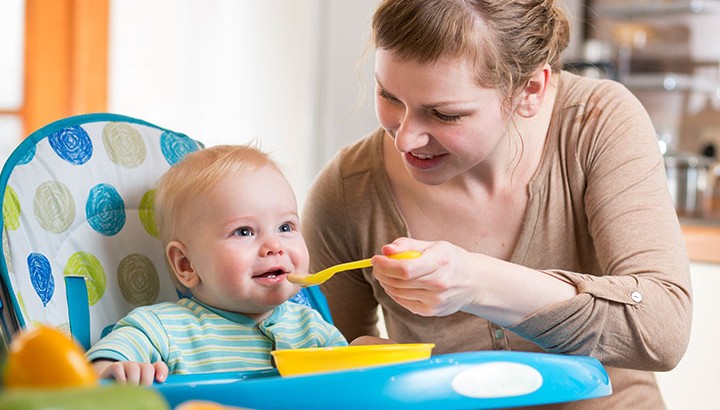Rice cereal with a bit of breast milk, infant formula or water has been the first food many parents feed their babies. It’s cheap, easy to mix with other foods and portable. It’s also easy for babies to digest and unlikely to cause an allergic reaction. “Babies have been eating grains for decades and they are well tolerated, which is one of the reasons why they are a good first food,” said Karen Ansel, a registered dietitian nutritionist in Syosset, New York, and co-author of “The Baby and Toddler Cookbook: Fresh, Homemade Foods for a Healthy Start.”
Rice cereal has also been touted as a healthy first food because it gives babies the nutrients they need, particularly iron and zinc. At around 6 months of age, breast milk iron stores naturally decrease. Plus, when both breastfed and formula-fed infants start solids, they get less of these nutrients and need to replace them with solids, which support their rapid growth, said Sara Peternell, a master nutrition therapist in Denver, Colorado and co-author of “Little Foodie: Baby Food Recipes for Babies and Toddlers with Taste.”
In recent years however, rice cereal has become less popular.
“What we’re realizing is that grains really don’t need to be a first choice,” said Dr. Anthony F. Porto, a board-certified pediatric gastroenterologist and assistant professor of pediatrics and associate clinical chief at Yale University.
The American Academy of Pediatrics (AAP) states that there’s no medical evidence that starting solids in any particular order has any advantages.
“This idea of giving them ‘smooshy,’ bland, wallpaper-tasting rice cereal because we believe it’s either easier on their taste buds or easier on their digestive system is becoming a very outdated first-foods-for-babies recommendation,” Peternell said.
In fact, studies show babies’ food preferences actually start in utero. Babies whose mothers drank carrot juice during pregnancy and while breastfeeding had fewer negative expressions when they started to eat carrots than infants who had not been exposed to the flavor, a study in the journal Pediatrics found.
Amylase, Arsenic and Allergies
“We’re learning that grains may have somewhat of a detrimental effect,” Peternell said, adding that amalyse, the enzyme which allows babies to digest and break down complex grains isn’t present in their salivary glands until their molars come in.
“Babies have very immature digestive systems, so to speak, so when we introduce something that’s more of a refined grain, that takes a lot more energy from the digestive system to try to break it down and also to extract the nutrients,” she said.
Often times when babies start both gluten and non-gluten varieties of grains, they can experience stomach pain, become constipated and have changes in their stool patterns.
“They may even potentially develop some food intolerances because their gut is just not prepared yet for some of the protein components in that particular food,” she said.
Is rice cereal the best food for baby?
‘World’s smallest baby’ thriving after premature birth
Comparison of commercial and homemade infant meals finds flaws in each
Another concern about feeding babies rice in particular is the high levels of arsenic that it contains. In April, the FDA proposed a limit of 100 parts per billion (ppb) for inorganic arsenic infant rice cereal.
Although wheat shouldn’t be offered as a first food, it shouldn’t be avoided either and offered only after your baby can tolerate other foods.
“What we’re finding actually is that if you are strictly avoiding those foods, you may actually be encouraging your child to develop allergies because their bodies are not coming in contact with these allergens and when they finally do, they really don’t know how to handle them,” Ansel said.
Variety is the spice of life
Although babies do not need grains, they do need to eat complex carbohydrates, Peternell said, adding that butternut squash, zucchini and sweet potatoes are all excellent choices.
If you’re concerned about arsenic in rice, you don’t need to avoid rice altogether.
“What you wouldn’t want to do is rice cereal three times a day, every day,” Ansel said.
If you choose to feed your baby grains, choose a variety such as oats, multigrain cereal, barley, quinoa and millet.
Traditionally, first foods around the world have been meat, which have the same level of fortification of iron and zinc as fortified cereals, Porto, who is also the author of “The Pediatrician’s Guide to Feeding Babies and Toddlers,” said.
In fact, breastfed infants who were fed pureed meat had higher levels of iron and zinc than those who were fed an iron-fortified infant cereal, according to a study in the Journal of Pediatric Gastroenterology and Nutrition.
If you’re raising your baby as a vegetarian, egg yolks are also a good option. Although legumes are iron-rich, they’re not a complete protein unless they’re combined with grains and they should be offered occasionally and when your baby is older, Peternell said.
If you decide to offer grains and you find it makes your baby constipated, foods such as prunes, plums, pears, peaches and apricots can help combat it.
Also, keep in mind that no matter what types of foods you introduce, you should start to offer a new first food every three to five days.
“The most important thing is you want to give your baby a wide variety of solids,” Ansel said.
Source: http://www.foxnews.com/health/2016/09/11/are-infant-cereals-really-best-first-food-for-babies.html


